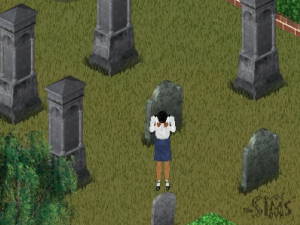Tuesday 6 May 2003

|
Pic of the day: Cassandra Goth from The Sims. Sorry Cassandra, we didn't believe ... SARS: The final frontier?When I first wrote about this viral pneumonia, the WHO estimate of mortality was 3-4%. I was more pessimistic: Since only 80% had recovered, there was still a risk that some of them would die. Mortality could easily exceed 5%, perhaps even 10% in places with little or no hospital care. Boy was I wrong. Dead wrong. 19.5% of the early SARS cases in Hong Kong are dead by now. One out of five. About half of those over 60 years, and one in ten of those under ... But the numbers may be too small to break it down in such detail. Still, the overall numbers are not likely to go down when the hospitals run full and equipment supplies run empty. We must face the fact that likely as not, one billion people may die over the next couple years. The best poised countries have a young populace and little poverty. This is a rare combination indeed, since falling fertility is one of the surest sign of affluence. Ironically, China may still qualify. The 1-child policy has only had one generation to work, meaning that most people are still young. It was never fully implemented in rural areas anyway. And economic growth has been impressive for a long time. On the other hand, it seems the elderly are doomed no matter what, or at least half of them. Hong Kong and Singapore may not be world leaders in health care, but they are better off than most European countries, and much of the population in the USA fall short of the same service too. This means that if (or, barring a miracle, when) the virus gets loose, we may lose most of our senior citizens. Senators, cardinals, folks like that. Not just the ones who sit all day blinking in an institution. No, although they're likely to go too. But also people who are just starting to look forward to their retirement. Experts in various disciplines, leaders and foremen. Moms and dads. And it's not like you pass some magic threshold at 60. Young people die too. And my own generation, those around 40, our immune system has already begun to shrink a while ago. This is not such a big deal usually since we have met most of the pathogens and have memory cells in our body with the recipe for antibodies. But meeting a brand new virus, we will be at a disadvantage, just not as badly as the elderly. There is going to be more orphans than we have seen in some centuries, I'm afraid. ***This is a much worse scenario than the "decimation scenario" I described on April 25th. Why is it so dramatically worse? It's only twice as many people, after all, and a good number of them aren't even working anymore! So why am I now suddenly worried about the future of our entire civilization? The answer is found in the newly explored borderland between network theory and chaos theory. In everyday life, it is not our laws that bind us together, not the police or the military, not even the church. It is our personal connections: Family, friends, colleagues, fellow believers. Not all of us have all these, of course, and most of us belong to more than one network. A few live on the fringe, being connected to the world mainly though one or two people. But some are also "hubs" and "bridges", unusually connective people who either focus one network or connect to several different networks, often both. These are the ones who give the "small world" effect. Most people are connected in groups, they are friends with their friends' friends. Each of them know perhaps one or two people that their friends don't know too. But then there are some who connect to wildly different networks of people, and are accepted in them all. When a small number of people are taken out of the system, most of the hubs and bridges will remain. Enough of them to keep the connection – there is some redundancy in most human networks. But with the loss of 20%, things change dramatically. The redundancy fails. Networks fall apart, and worse: Bridges between networks disappear. Cliques of people become isolated. Even though they are not technically or formally isolated, they are socially isolated. Imagine a world teeming with groups of people who feel alone in the world, paired with a general feeling that this is The End of All Things. This is bad, really bad. It is exactly what we don't need.
I don't foresee the end of civilization, but a temporary disruption
could happen if we are caught unaware. Obviously we must try to contain
the virus for as long as possible, but other less obvious things must be
done, and can be done by each of us. We have to reach out and build new
networks, less obvious ones. And I don't mean superficial networks like
chat rooms. Here are a couple relevant questions: I am certainly not trying to create a panic. I am trying to prevent it. If some of us panic now, we may avoid all panicking at the same time later. |
Warm sunny day again. |
Yesterday <-- This month --> Tomorrow?